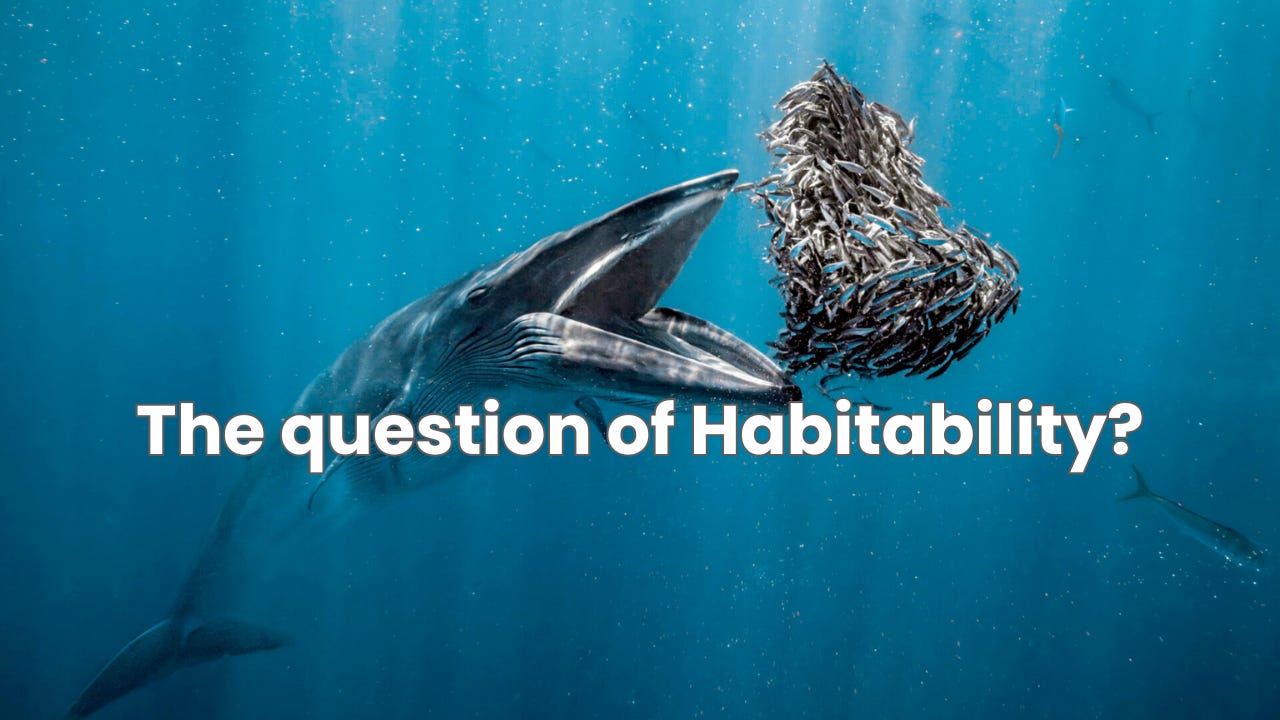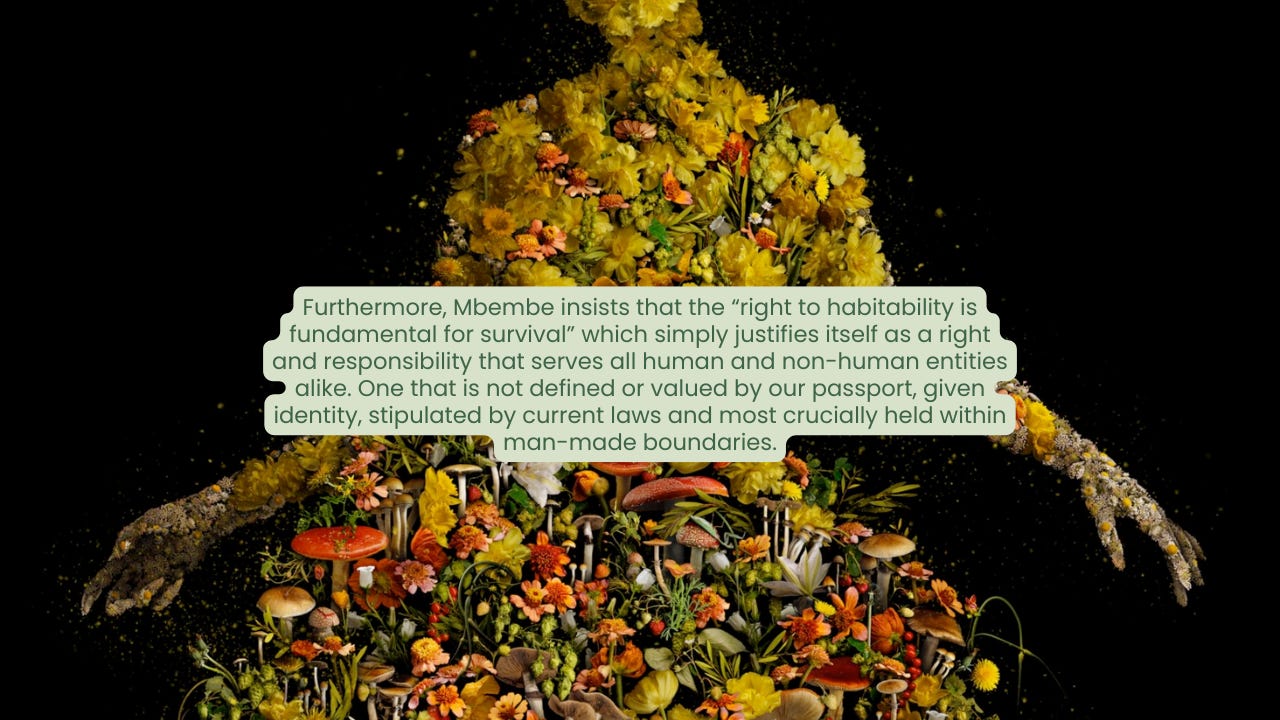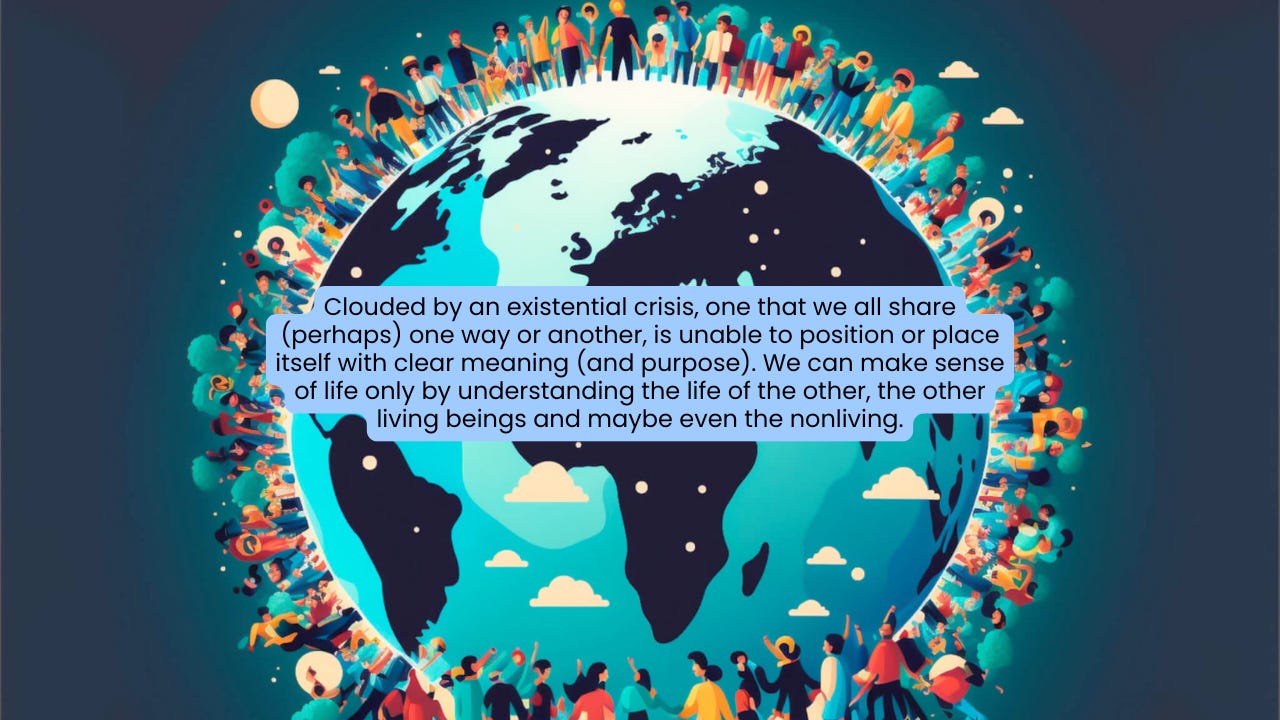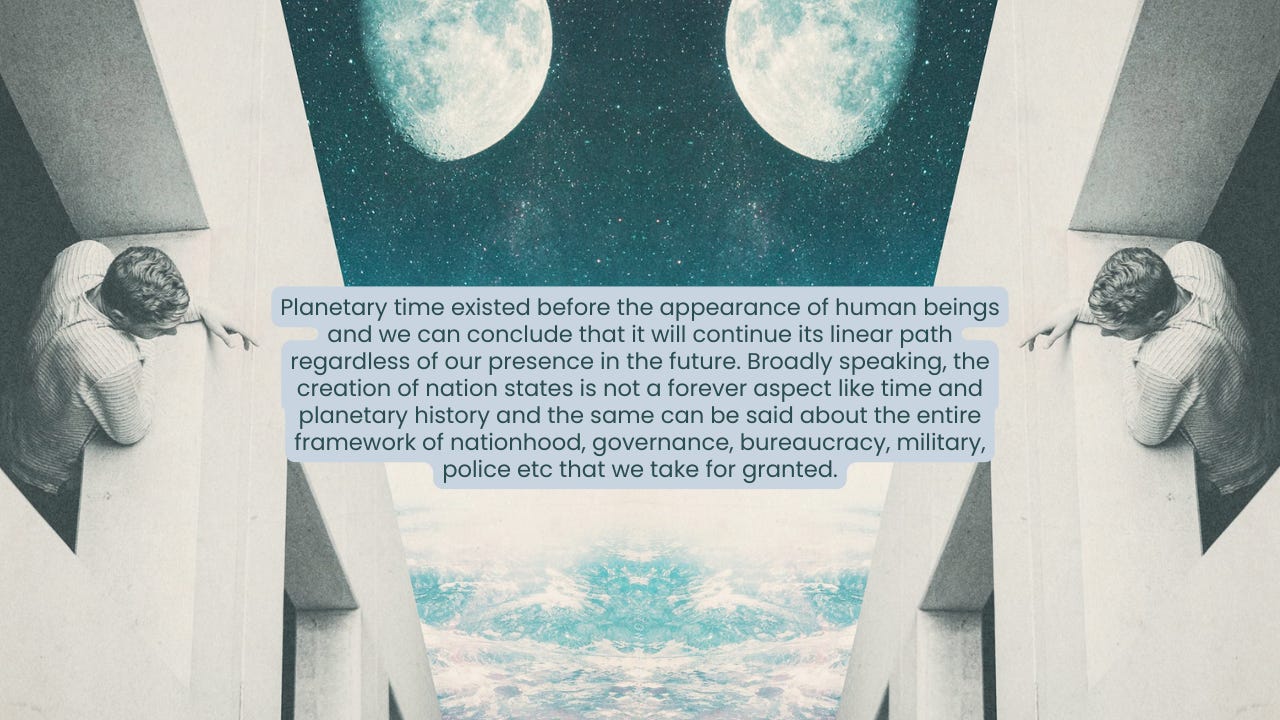The question of Habitability?
Situating 8 billion people above nationhood and territorial identity.
If one could take a snapshot of the current zeitgeist of the world, what would it look like? What would it signify 50 years from now? A farewell to democracy in slow motion? A “burnout society” of enmity and overshoot? A world of relationships without desire? An eternal cosmos of digital addictions and neuronal reconfiguration? Horrific wails of blood-stained children and announcements of genocide featuring dismembered beings? A world of mass surveillance and unlimited information? A time of medication as well as poison? The awakening of decolonization and “forever wars” of conquest and occupation, between opposing faiths? Of reform, redemption, transformation, abandon and magic healing? All the above and much more, together symbolize the sacrament of our times, and may set off our thoughts in any direction, forming new relations with each word or a set of affirmations. Dystopia or Utopia, the extremes of which we know well or several coexisting myth-based-realities that keep us busy and behaving, while terrible outcomes are altering the previously held definition of life and its continuity.
A momentary burst of sunlight on a cloudy day can set off emotions in many directions, by virtue of a play, between darkness and light. One follows the other and both symbolize an eternally occurring inversion within Nature. The modern techno-industrial human is also besieged by darkness (fear) and the momentary dispersion of light in the form of hope, knowledge and bonding within shared cultures. The “climate” of a society consisting of 8.1 billion people itself is undergoing an evolution that is irreversible. Long-term shifts (positive and negative) in the temperament, tolerance, sociopolitical outlook and psychological patterns. Such shifts are not natural, nor due to “anthropocentric climate change” but because of human activities and beliefs since the mid-1800s, leading up to current magnitude of technological society. One can say this aspect of “change” within the “climate” of global society, is not because of “burning of fossil fuels like coal, oil and gas”. The current rupture of previously held myths, goes way deeper and further than current western scientific resolution. The instability, extremity and cascading outcomes of climate change in reality very much correlates with the vulnerability and incompleteness we feel and deal with. All the while completely surrounded by invisible webs. A life deeply embedded within the technosphere that provides untold benefits and a range of threats at the same time.
The following story is motivated by three emerging facets of our world, which are unable to contain themselves or remain within existing maxims of governance, law and economics. Three radical and globally prescient visions. One, that debases the universal worldview, framed on western democracy and the Enlightenment. Two, a genuine and commonly usable deconstruction of the world in transition. Three, our return to life, one that has been abandoned to the powers of death. Imminent threats which common beings face, governed by extraordinary power and ideas, the will to overcome and the involved tyranny.
“I ponder the consequences of this inversion and the novel terms within which the question of relation - between violence and law, norm and exception, the state of war, the state of security, and the state of freedom are now posed… never-the-less what matters above all else is our common vulnerability and finitude…” Achille Mbembe (Necropolitics).
Clouded by an existential crisis, one that we all share (perhaps) one way or another, is unable to position or place itself with clear meaning (and purpose). We can make sense of life only by understanding the life of the “other”, the other living beings and maybe even the nonliving. Like Franz Fanon insisted, that he himself existed as a “living form” only when he could rectify the asymmetry of relations with a “dimension of reciprocity and care for humanity”. Our attitude towards reciprocity and care is largely defined and influenced by a range of ideas - of nationhood, race, identity, language, knowledge, law, history, wealth, property and on and on. Regardless, some of these constructs can also be understood as totally imaginary (myths) or as invisible boundaries, which prohibit “relation” with the other, the outsider, the alien, the supposed enemy, the one who is excluded or is deemed inferior, marginalized or even killed. For one set of people to thrive on the planet, the rest must toil, must pay a price and worse be sacrificed frequently. Decades ago, famous historian Arnold Toynbee viewed the price of civilization correctly by saying “the West needs to acknowledge and atone for its aggression if the world is to find peace and stability.”
The word habitability, which symbolizes “the quality of an ecosystem, of being good enough to live in.” or simply put you love the fact that your neighborhood or town is a “great place” for all different types of people to live. Habitability was at some point in the past a matter of planetary choice, yet defined by natural limits such as oceans, rivers, mountains, deserts, forests etc. Human ingenuity, technology and terraforming overcame all that over centuries. The world is divided into 195 nations small and big, yet 90% of them did not exist 200 years ago. How and who all created them is an entirely different story, all be it an outcome that has lead to a cascade of disasters in their own right. Planetary time existed before the appearance of human beings and we can conclude that it will continue its linear course, regardless of our presence in the future. Broadly speaking, the creation of nation states is not a forever aspect like time and planetary history and the same can be said about the entire framework of nationhood, governance, bureaucracy, military, police etc that we take for granted.
The “new partition of the Earth” emerged just about two hundreds years ago and at its center were the Western powers, and on the margins, the peripheries were realms of excessive struggle, poverty, destined for occupation, instability and pillage. A while back, many people were convinced that the world had moved from the terrifying prospect of nuclear war of the Cold-War, only to return to a worse situation, turning back the Doomsday Clock ever closer to midnight. Is that horrible epoch is ending, for worse lack of habitability to come? Also pointing to new blow-back and “borderless worlds” in the future.
Born and raised in Cameroon, writer, historian and political theorist Achille Mbembe unpacks the possibility of a “borderless world” as an extension of a decolonized future and the eventual elimination of what we know (and sometimes pride upon) as nationality. As markers of identity, falling upon superiority or inferiority, color or language, Mbembe warns us that eventually nation states, especially those created as an outcome of European colonialism and 20th century wars are a severely harmful idea, akin to organized religion, imposed upon very large masses of human beings. He makes it sufficiently clear, that race was initially an euro-centric understanding of the “other” and as a technique has been weaponized to collectivize and punish people ever more intensively by those who firmly situate themselves as the “high priests of a given race and all its dominant heteronormative philosophies”. Furthermore, Mbembe insists that the “right to habitability is fundamental for survival” which simply justifies itself as a right and responsibility that serves all human and non-human entities alike. One that is not defined or valued by our passport, given identity, stipulated by current laws and most crucially held within man-made boundaries. Is funny, that the ones who are most terrified of such a borderless prospect, are the ones who dearly hold on to or bemoan the loss of past-paradise. In other words, they wish to avoid global catastrophe and disasters and at the same time, they also wish to retain their past-paradise, energy, private wealth and property. Hilarious or schizophrenic this “garrison mentality” or perhaps equitable to a child who refuses to grow up. But once politicized and internalized, the “garrison mentality” can turn devious, as a permanent measure of boundary.
“Necropolitics” a term coined by Achille Mbembe, as a practice or a dominant ideology has proliferated across the world, whereby the well-off belonging to any race or nation can and will justify, openly or tacitly, the sacrifice of everyone else to protect the nation, society or what remains of their “share” of Nature. The prime identifier of this system is racism, all be it actuating in visible or invisible ways. Educated folks especially pertaining to the knowledge economy are representative of a “globalized biopower” - the Foucauldian term, of social and political power to control people's lives, thoughts and decisions. This dominant bourgeois ideology is pan-global and not just situated in the West. Mbembe’s verdict on the parasitical mechanisms of “Necropolitics” finds resonance with human beings who need and demand better habitability above all else. Makes sense to those of us increasingly lead by biocentric and not technocentric belief systems.
To be able to understand the representation of real people facing real scarcity, Mbembe is precise, by saying “In Africa, these upheavals are reflected in cascading disruptions and intensified struggles for access to livelihoods. The resulting violence and the resulting fractures give rise, almost everywhere, to doubts about the sustainability of our societies and communities.” Within “Necropolitics” is also nested various messianic quasi-religious verdicts of incoming catastrophe, a set of conditions that human beings have brought upon themselves. Similar to the prophets and moral imperatives, the Judeo-Christian verdicts of the ancient Bible and Torah.
The proliferation of industrial capitalism, lead to a big redistribution of populations and materials across the planet. European and American slave trade thrived on its “hemorrhaging and draining of the most useful arms and most vital energies of the slave”. The entire world was fair game for conquest and conversion - “replace ecosystems with agrosystems”. Striking irony, that about 300 years later, we see a mass exodus of refugees from those very “sacrifice zones” (This Changes Everything by Naomi Klein). The above historical legacy that is often touted as a trajectory of unbelievable progress and development, also wielded a mass exodus, refugees and illegal migrants scattered around the world, especially besieging the North (EU and North America).
As a consequence the entire world is now entwined in racial principles, identities and return to enclosures, much like how it was at the zenith of European colonization a few hundred years ago. It has only gotten worse, not just because of population as certain experts like to explain, but the devastating parasitical grip of capitalism, one that sustains itself upon rising material scarcity and forms of violence imposed upon the many by the few. That is sufficiently clear within the erstwhile affluent west, compared to the “deregulated rest”. The globalized visions and sermons of Samuel Huntington and Slavo Zižeck rendered worthless, by a reality fraught with global destabilization, unrest, unprovoked invasion, infiltration and ever frequent catastrophes (man-made or natural).
The racist Islamophobic rhetoric and propaganda by Sam Harris and Richard Dawkins, has percolated into stereotypes for many people in the West, including political leaders, media personalities, social reformers, scientists and policy experts to name a few. Is also why it has become acceptable to openly say unspeakable things about Muslims ever since 9/11, that could never be said about any other ethnic group or minority in history. This “othering” is clearly a form of dehumanization akin to racism.
The prospect of collapse, of western liberal democracy (WLD) and capitalism has been given sufficient attention by geopolitical experts, academics, Marxists and common people for well over forty years. While some folks huddle and speculate over the reformation of fascism, another group is cheering for the return of communism. Without doubt, Marxist philosophy and discourse has returned from exile. More and more evidence about the “Deep State” makes it sufficiently clear, that anti-democratic interests and capitalist power operates and orchestrates itself, violating laws and undermining every important aspect of WLD. One way or another, the polemic representation of the debate poses provocative questions, outside conservative circles and those who wish to preserve the 20th century global order. Why should WLD be destroyed? How can it be eliminated and consequently who all will actually benefit from the collapse and what all will get busted?
French philosopher Étienne Balibar provides a bunch of ideas to begin as an “approach to catastrophic times”. Referred to as the “negation of the negation” Balibar reminds us about the power of social change, in which the exploitative capitalist system is eventually superseded by a socialist revolution that “negates the negation”. Something that has happened across the world throughout the 19th and 20th century. Alas the winner, or say power of capitalism, in its current “ultra-financilized form” is all about extraction and short-term gains. A genuinely selfish and fatal belief that has wielded ever frequent disasters and waves of misery, effectively consuming the “tree of life” besieged by a parasitical system backed by the vicious messianic billionaire class. To separate (or salvage) WLD from neo-liberalism, exploitation, poverty and capitalism is impossible, almost like splitting up Siamese twins. Much like the duality of modern technology and tyranny. Balibar also reminds us that “current wealth gap and stifling inflation” is very similar to conditions at the beginning of the 20th century. The population of the world was 7 times less back then, just for context. Factors which map the governance of the entire world, are inextricably tied to each other. The only ones who find themselves outside that totalitarian eventuality are the illiterate and the “abandoned of the world”.
Étienne Balibar outlines the incoming return to socialist management of society as “the magnitude of current changes are bound to carry over, as impact through decades and most likely create ungovernable regions within the political map of the world, including the European Union and North America. But the indictment we set upon the agents of capitalism and the forthcoming revolution cannot be taken as self sufficient, without creating new systems of social power, production and consumption.. interdisciplinary in nature, commonly actuating on technological, social and spiritual levels. The various dimensions of catastrophe, force us to consider socialism over incoming barbarism… and by barbarism I mean endless wars, racism, concentration of capital and power viz-a-viz fundamentalism and nationalism, sustained by media propaganda, dystopia or utopia.”
In 2019 there were approximately 82 million refugees in the world. The figure stands at approximately 118 million today. One out of every 68 people on Earth is now “displaced”. Nation states and global organizations like the UN, Save The Children and UNRWA cannot resolve the current outflow of people, towards multiple uncertainties and across geographies. Waves of migration from the global South towards the North, via thousands of routes, has begun to blur the criteria of “national belonging”. Thousands are fleeing the West as the prospects of democracy diminish altogether. This has not only caused alarm and concern, but also a learning about the temporal nature of identity based on loyalty to a nation, holding a passport or signing up for a type of governance. Is obvious that survival is way more prescient, than the imposed geopolitical limits and range of tactics to militarize borders.
To belong to a nation is no longer based on origin but also of choice and ability. Which is why an ever growing number of people participate in several “types of nationalities” attempting to migrate, however under legal or illegal conditions. The numbers are most often used to arouse fear of and propaganda against outsiders and sometimes even baseless hysteria of “invading hordes and criminals”. One can understand this as a deep conviction shaped by the dominant cultural apparatus of a society - Hollywood, disaster fiction, overall surge of dystopia, climate anxiety, extreme events and the return of “conservative but tiny opulent societies” (Karl Popper, Enemies Of Open Society). But neither the environment nor Nature, or the impacts of natural and man-made events can be contained by international borders or by a “garrison mentality” (Northrop Frye) or by high-tech military intervention, for what has already become a global and terrestrial condition, that impacts every human being. Include all “agents and milieus of life —water, air, dust, microbes, bacteria, insects…the dispersion of metals, minerals and chemicals into the oceans and rivers… the entire panoply of the Earth’s new inhabitants and their righteous claim to habitability” (Achille Mbembe).
If we return to what all that birthed the modern world, or call it the “scene of crimes” we would find untold misery and almost endless sacrifice. Geographies defined by slavery, dispossession, settler colonialism and the origins of capitalism. Great values set at the foundation of not-so-great nations are eventually giving way to common vulnerability, chaos, loss of habitat, deadly unchecked technological power and eventually to the realization of ‘finitude’ (nothing is forever). But ultimately, if humanity exists through being in and of the world, we may create mutually useful relationships with the others. Based on the reciprocal recognition of our limits and finality. Otherwise everything can be transvalued as a commodity, up for exploitation by the few over the backs of the many.
However many billion people as of now or next year, the Earth will always remain a fixed system. Within that framework, consisting of general ecology and a broadened geography, one that is spherical and open, makes us truly planetary. I no longer believe that the world is an artifact that only humans make. We just happen to inhabit within, yearning for more habitability and reciprocity for the time being. All be it in ever significant numbers, caught between intense lights or engulfing darkness.
👶🏾🌶️🦔🧒🏾🐌…
🍉 In case you wish to pledge support with a paid subscription 😌 CLICK HERE 🙏🏽
(yes it helps a lot )







While I enjoyed and agreed with much of the article, there is a disconnect between the message and its accessibility. It is a very common problem, one I struggle with myself in my writing. How can I express myself in a vocabulary that will reach as many people as possible, or is that an impossibility? I know that for all sorts of reasons there is no way to reach everybody. Hell, most people don't read anything but what they see on social media. If we write in a way that only speaks to the 'highly educated,' are our efforts anything more than 'intellectual masturbation?' Again, I ask this as someone who also struggles with the issue. For myself, I am beginning to think I need to separate my writing life and whatever conversations I can have with 'ordinary folks.'
This is a wonderful synthesis of so many issues all pointing to the uniqueness of what is today and the inevitable transition to what comes next. Regarding John Stuckey's comment, Marcel Duchamps famously insisted that the ideal audience is one that comes 50 to 100 years after your death; they will understand your work in your posting, Counter, much more than today's audience. But with the unfolding climate disaster we'd better shorten that to 5 to 10 years after your death...